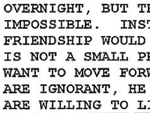In Remembrance: September 11, 2001

Some students in class today may have clear memories of the events of September 11, 2001. Some may have vague memories. Others may have been born years after the attacks. The 10th anniversary of 9/11 presents an opportunity for educators to explore with students what it means to experience history. Were students alive during the attacks? Do they remember them? How do their parents remember the attacks? How did adults they know make sense of the events as they happened? How do people who were alive during the attacks interpret the past when its events are close and painful? How long does it take for historians to find a framework in which to fit events such as 9/11? People watching the World Trade Center towers collapse knew that 9/11 would appear in history books later—what has happened during students' lifetimes that they think was "history in the making?"
One way to teach 9/11 is to compare and contrast it with other past events that witnesses believed were history in the making. Lesson plans often feature the bombing of Pearl Harbor and the assassination of JFK as comparable to 9/11, but what about the bombing of Hiroshima and Nagasaki? The assassination of Abraham Lincoln? The assassination of William McKinley? The Boston Massacre? The Springfield Race Riot of 1908?
How many people witnessed those events? How many of them witnessed them in person? How well were the witnesses prepared for the events? Did they know ahead of time what the effects might be? Did they share their eyewitness knowledge freely with others, or keep it secret? What did people write about these events immediately after they happened? Years after they happened? Does where something happens make a difference in how people react to it? Has technology made a difference?
Regardless of how you choose to teach 9/11 and whether or not you contrast it with other historical events, approach the subject thoughtfully and with clear goals. To honor the anniversary and to help you as you learn about, teach, and remember the day and its effects, we've gathered together our 9/11 resources on one page: "In Remembrance: Teaching 9/11."
Our spotlight doesn't include all of the many resources available online. More examples follow. Some were created in the immediate wake of 9/11 and some were created 10 years later, in the present day. You can use the older materials as they are, or use them as primary sources in their own right. They represent snapshots of writers, publications, and educators trying to make sense of a sudden, horrifying event.
If you are contrasting 9/11 with other traumatic events in U.S. history, you may want to compare these early reactions with early reactions to those events. How did schools, educators, and students react to violence in the past?
From 2001:
- A New York Times lesson plan published on September 12, 2001, suggests ways educators can help students think about and process the attacks.
- A Special Report from Rethinking Schools discusses teaching in the wake of the attacks.
- America Responds, a PBS website, documents PBS stations' responses to 9/11, maintained throughout 2001; it includes nine lesson plans.
- Scholastic catalogs its student and teacher resources published during 2001, on a subsite of its page created for the 1st anniversary of 9/11.
From 2011:
- Recordings of presentations from September 11: Teaching Contemporary History, a two-day conference presented by the Smithsonian National Museum of American History, National September 11 Memorial and Museum, Pentagon Memorial Fund, and Flight 93 National Memorial, consider how understanding of 9/11 has changed.
- Articles from the Organization of American Historians on teaching 9/11 draw on memories of 9/11 submitted to websites (follow the link and scroll down to the "Editor's Choice" selections).
- A free curriculum guide from the 4 Action Initiative includes more than 130 lesson plans for K-12.
- A call for teachers from the New York Times asks educators to contribute their strategies for teaching 9/11, and a later article pulls together NYT resources
- Two simple timelines look at themes related to the attacks at Pearson's Online Learning Exchange
- A free oral history lesson plan from Brown University's Choices program
- EDSITEment's lesson plans on 9/11 and heroism
Many websites and publications also offer primary sources, yet to be interpreted for educational use or packaged into lesson plans. If you have the time to search for and browse these materials, they can provide a rich base from which to assemble your own comparison of past and present. Here are some examples:
- The New York Times' "Times Topics" page collects all NYT articles and photographs that mention 9/11. It archives original coverage of September 11 and NYT anniversary pages from 2002 to 2006, as well as short biographies memorializing the victims of the attack (see "Portraits of Grief").
- Lectures and panels from Columbia University respond to and attempt to contextualize 9/11.
- Columbia University also created a guide to key documents on presidential, administrative, congressional, and international responses to 9/11.
- Archived television footage from ABC, BBC, CBS, CNN, FOX, and NBC spans September 11–13.
- Legacy.com's Remember: September 11 preserves biographies of the 9/11 victims, searchable by name, home city and state, and flight.
- Sourcebooks from the National Security Archive gather up primary sources related to U.S. policies on terrorism, Afghanistan, biological warfare, anthrax attacks, the Taliban, and Osama Bin Laden.
- More than 50 eyewitness interviews share memories on topics such as "Hijackers," "FBI," and "1993 WTC Bombing," courtesy of National Geographic.
- The American Red Cross's Exploring Humanitarian Law curriculum, while not focused on 9/11, models strategies for teaching about difficult subjects and thorny emotional and ethical questions.


